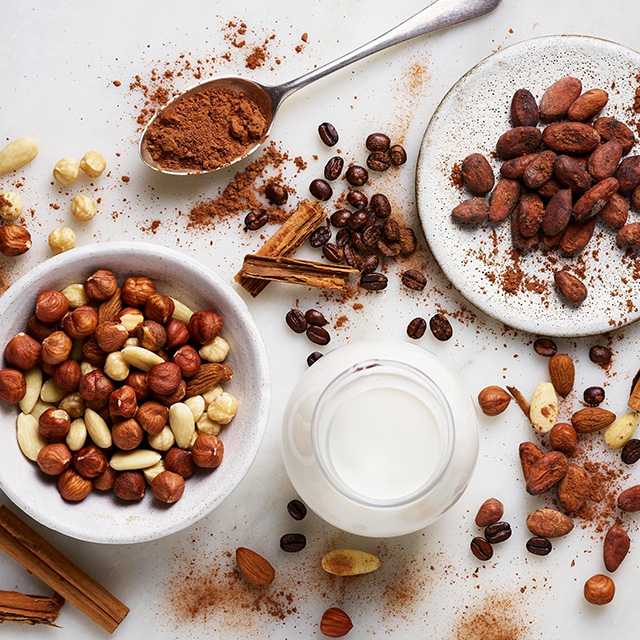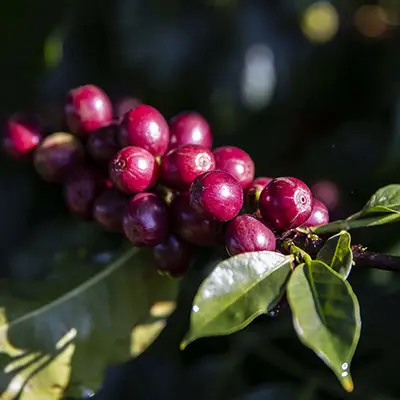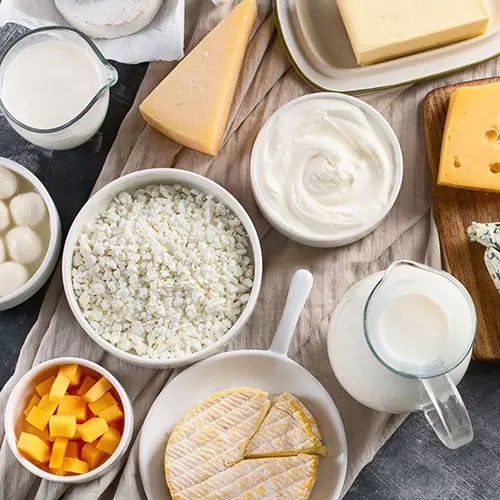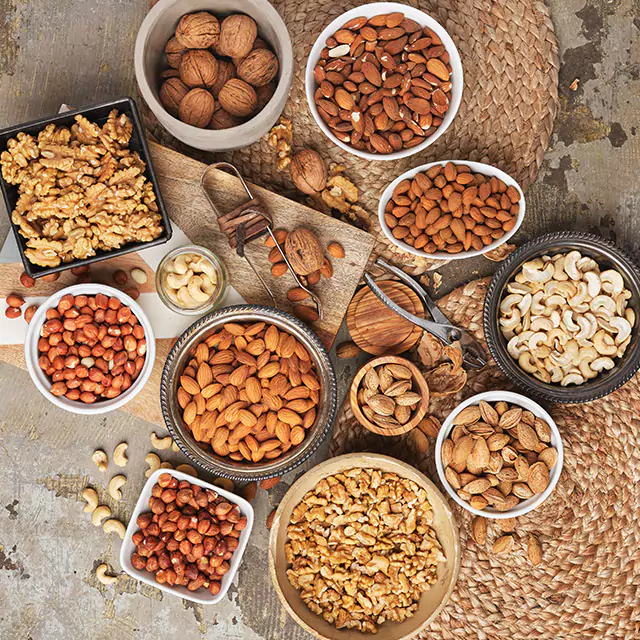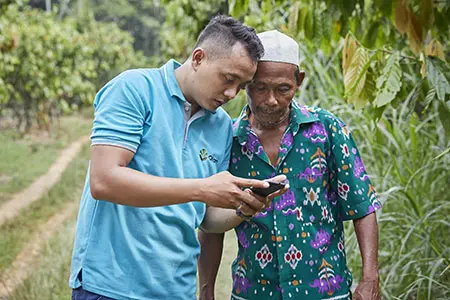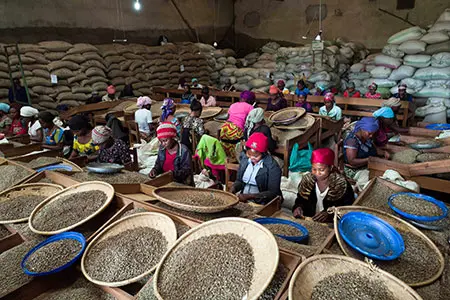Leading food ingredients supplier of what matter
Our cocoa, coffee, dairy, nut and spice ingredients are heaped with sensory and functional features – while we’re also able to offer product that is traceable, sustainable and transparent. As food ingredients company you can develop winning consumer products in bakery, beverages, dairy, culinary, savory, snacking and sports nutrition categories with ease, scale and integrity.
We’re a super specialist in all things cocoa – beans, powders, butters and beyond. In fact, we are the number one cocoa bean supplier globally with a leading presence in 10 key producing countries across Africa, Asia and South America. In our direct sourcing, our traceability from the farm to the factory allows us to drive sustainable practises across the cocoa supply chain.
Find out more about our cocoa ingredients offer.
A leading global supplier of green coffee, with a significant specialty and soluble coffee offer, ensures we’re buzzing with know-how. Our year-round presence in 18 major origins means we can offer you the responsible, traceable supply consumers want – and the rare roasts you need to differentiate your brand.
Find out more about our coffee ingredients offer.
Packed with natural goodness, fewer food groups bring more joy to people’s lives. It’s there in a cup of tea, slice of cheese, or spoonful of cream. Whether it’s a specific beverage blend or an exacting protein isolate or concentrate, we can help you deliver the tastes, textures and nutrition people love.
Find out more about our dairy ingredients offer.
We’re one of the world’s leading suppliers with integrated supply chains across six continents. Almonds to brazils, macadamias to pistachios – just name your nut. The natural and nutritional goodness makes them top of the list for consumers.
Find out more about our nuts ingredients offer.
We’re one of the world largest global suppliers of spices and herbs, sourcing from all the primary growing regions and offering everything from onion, garlic and chiles to pepper, parsley and tropical spices. Provenance, taste, quality, color and texture. There is not a lot we don’t know about spices and the important role their attributes play in our favourite foods.
Find out more about our spices ingredients offer.
Partnering at every step from raw materials to value added ingredients
This is how ofi as food ingredients wholesale delivers value to customers. We co-create to delight consumers, grow your business, and create real change for people and planet. We make this happen by offering fresh ideas, ingredients & solutions that are…
Our journey so far
We are privileged to carry with us the 30-year legacy and rich heritage of Olam, and that DNA of ambition and growth will continue to drive us in the future as a food ingredients company.
Olam International began back in 1989 by exporting raw cashews from Nigeria to India. Then came cocoa in 1992, followed by coffee in 1996, spices in 2002, and dairy in 2005. Olam continued to grow, investing in the breadth and depth of its portfolio and establishing global leaders for each business.
In January 2020, Olam reorganized into three groups: Olam Group and two operating groups: Olam Agri and olam food ingredients (ofi). ofi operates in 49 countries serving over 8,000 valued customers globally, leveraging its complementary and differentiated portfolio of ‘on-trend’ food products, to co-create solutions that meet changing consumer preferences.In January 2020, Olam reorganized into three groups: Olam Group and two operating groups: Olam Agri and olam food ingredients (ofi). ofi operates in 49 countries serving over 8,000 valued customers globally, leveraging its complementary and differentiated portfolio of ‘on-trend’ food products, to co-create solutions that meet changing consumer preferences.In January 2020, Olam reorganized into three groups: Olam Group and two operating groups: Olam Agri and olam food ingredients (ofi). ofi operates in 49 countries serving over 8,000 valued customers globally, leveraging its complementary and differentiated portfolio of ‘on-trend’ food products, to co-create solutions that meet changing consumer preferences.In January 2020, Olam reorganized into three groups: Olam Group and two operating groups: Olam Agri and olam food ingredients (ofi). ofi operates in 49 countries serving over 8,000 valued customers globally, leveraging its complementary and differentiated portfolio of ‘on-trend’ food products, to co-create solutions that meet changing consumer preferences.In January 2020, Olam reorganized into three groups: Olam Group and two operating groups: Olam Agri and olam food ingredients (ofi). ofi operates in 49 countries serving over 8,000 valued customers globally, leveraging its complementary and differentiated portfolio of ‘on-trend’ food products, to co-create solutions that meet changing consumer preferences.In January 2020, Olam reorganized into three groups: Olam Group and two operating groups: Olam Agri and olam food ingredients (ofi). ofi operates in 49 countries serving over 8,000 valued customers globally, leveraging its complementary and differentiated portfolio of ‘on-trend’ food products, to co-create solutions that meet changing consumer preferences.In January 2020, Olam reorganized into three groups: Olam Group and two operating groups: Olam Agri and olam food ingredients (ofi). ofi operates in 49 countries serving over 8,000 valued customers globally, leveraging its complementary and differentiated portfolio of ‘on-trend’ food products, to co-create solutions that meet changing consumer preferences.
Sourcing nuts, cocoa beans, coffee spices and dairy ingredients at scale is just the start. Our focus is on innovating in all areas of supply chains and taking care of our ingredients from plant to palate. Whether it’s introducing digital tech to improve traceability and reliability of supply, or helping spot trends and responding to them with new plant-based tastes and textures.
Sustainability’s been a big part of Olam’s identity since the start, supporting both the Millennium Development Goals and the Sustainable Development Goals of the United Nations Development Program. Much of this has been driven through award-winning farmer livelihood support programs. In 2018, this commitment was taken further with AtSource, the revolutionary sustainability insights platform.
Read ofi news
By Andrew Brooks, Head of Cocoa Sustainability, olam food ingredients (ofi)
This week, the world’s attention turns to a heavy burden that can damage a child’s Health and Education: child labour. In ofi's cocoa business, we are focused on solving this problem every day.
Most child labour in cocoa relates to children carrying out hazardous tasks on the family farm, distinct from the much rarer issue of forced labour, and has no one cause. Labour laws can be misunderstood, and schools might be located far away. Even if there is a school nearby, children may not have the documents they need to enrol. When combined with rural poverty, many parents think their child’s time is best spent helping on the farm. And now, these cocoa-growing communities are also battling a global health pandemic.
We’re working to tackle each of these challenges in turn. Under our Cocoa Compass sustainability ambition, we aim to completely eradicate child labour from our direct supply chain by 2030 and ensure farmers’ children can access the education they are entitled to. In 2020, we reached the critical milestone of rolling out child labour monitoring across 183,000 households in nine countries.
There is still a lot to do, and collaboration with our customers, national governments, and civil society is essential. For example, we recently asked the Fair Labor Association (FLA) to assess the extent to which cocoa farmers and their families have benefited from our sustainability programmes in Côte d’Ivoire, their perception and satisfaction with these interventions, and help to refine our approach further.
Using a due diligence methodology called Social Impact Assessment, the FLA collected extensive data and interviewed over 450 people from ten cocoa communities, including women and children. It found that of all our efforts to tackle child labour, the setting up of child labour monitoring and remediation and enabling access to education are the most advanced and have the most significant impact.
It also revealed that over two-thirds of those interviewed think child labour is on the decline in their community, and 80% believe that the interventions by ofi and our partners are contributing to protecting children.
There are areas for improvement. The FLA suggested we provide additional support to help farmers access affordable labour. And ensure greater follow-up with Village Savings and Loans Associations to maximise their ability to promote child protection.
We know that combining our efforts through multi-stakeholder partnerships, championed by local and regional governments, and supported by international finance institutions, is the best way to create the kind of long-term systemic change needed to reach universal school attendance
and graduation for children in cocoa communities.
This World Day Against Child Labour reminds us that if we want to put children first in cocoa, we must be open to testing new approaches and adapting our efforts based on what works best. The future of a cocoa generation is at stake if we don’t.


